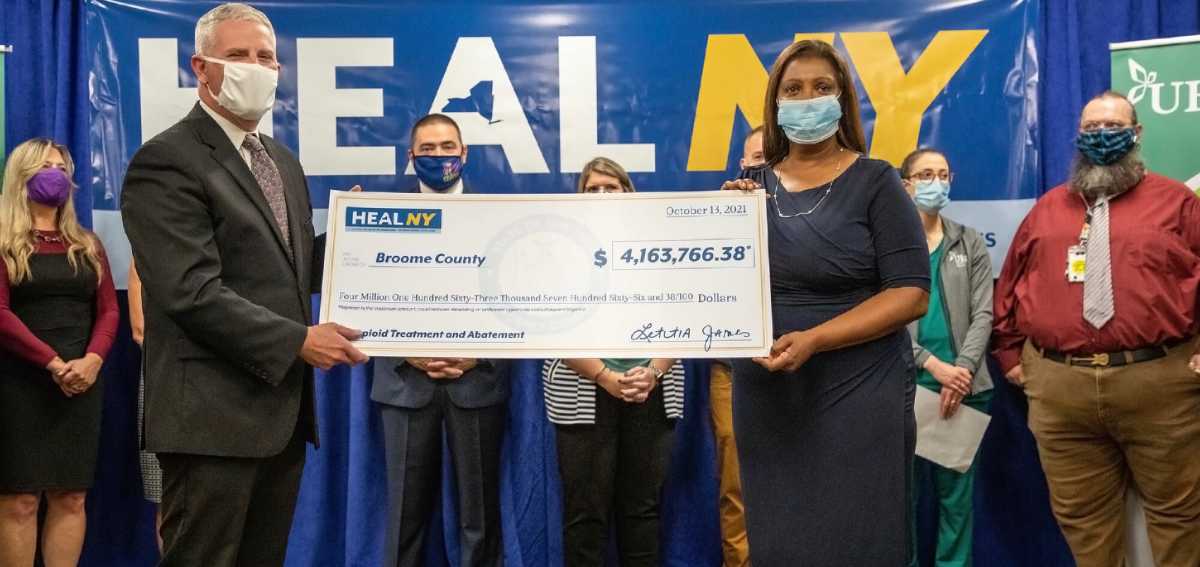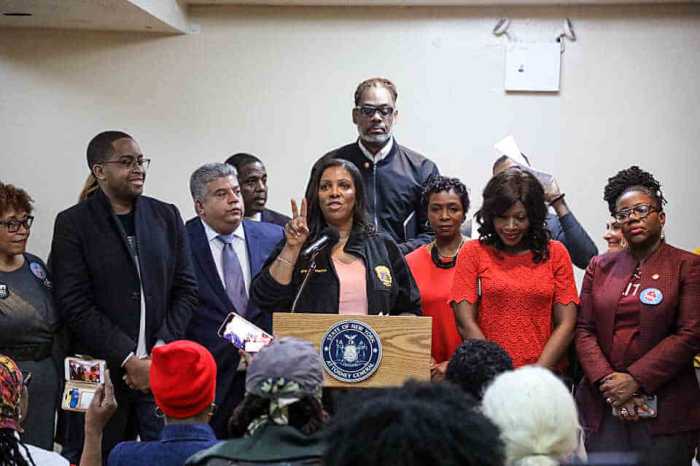New York Attorney General Letitia James on Wednesday continued her statewide “HealNY” tour of New York state with stops in Binghamton and Ithaca, where she announced that she will deliver up to $26.7 million to the Southern Tier to combat the opioid epidemic.
The funds come from different settlements Attorney General James has negotiated following her March 2019 lawsuit against the various manufacturers and distributors responsible for the opioid crisis.
James’ tour will make stops in dozens of New York counties throughout the month of October, with up to $1.5 billion in funds going to counties across New York state.
“The Southern Tier has sadly seen the deadly and addictive side of the opioid crisis for the last two decades, but, today, we are beginning the process of healing New York by announcing that we will provide the region with up to $26.7 million to invest in opioid prevention, treatment and recovery programs,” James said.
“While no amount of money can ever make up for all those we have lost, these funds can help the Southern Tier turn the tide on this epidemic and prevent future devastation,” she added.
The lawsuit James filed in 2019 was, at the time, the nation’s most extensive lawsuit against the various manufacturers and distributors of opioids.
She said these manufacturers and distributors were responsible for heavily marketing opioids to doctors, hospitals, health care systems and others, which led to the over prescription of the drugs across New York and the rest of the nation over the last two decades.
The manufacturers named in James’ complaint included Purdue Pharma and its affiliates, as well as members of the Sackler Family (owners of Purdue) and trusts they control; Janssen Pharmaceuticals and its affiliates (including its parent company Johnson & Johnson); Mallinckrodt LLC and its affiliates; Endo Health Solutions and its affiliates; Teva Pharmaceuticals USA, Inc. and its affiliates; and Allergan Finance, LLC and its affiliates.
The distributors named in the complaint were McKesson Corporation, Cardinal Health Inc., Amerisource Bergen Drug Corporation and Rochester Drug Cooperative Inc.
Last month, a settlement with Endo was announced that has already delivered $50 million to New York state and Nassau and Suffolk counties to combat the opioid crisis and remove the opioid manufacturer from New York’s ongoing opioid trial.
Also, last month, a settlement that secured more than $4.5 billion — at least $200 million of which will be earmarked for New York — from the Sackler family and foundations that they control, ends the Sacklers’ ability to manufacture opioids ever again, and will shut down Purdue Pharma was announced.
In July, a settlement with McKesson, Cardinal Health, and Amerisource Bergen that will deliver up to $1 billion to New York state to combat the opioid epidemic was announced.
In June, a settlement that ended Johnson & Johnson’s sale of opioids nationwide and that will deliver $230 million to New York alone was announced. The deals with Johnson & Johnson, McKesson, Cardinal Health and Amerisource Bergen have a global value of about $26 billion.
The cases against Mallinckrodt and Rochester Drug Cooperative are now moving separately through U.S. Bankruptcy Court.
The trial against the two remaining defendants — Teva Pharmaceuticals USA and Allergan Finance — is currently underway and continues in state court, James said.
Pursuant to the new law establishing the opioid settlement fund, she said all funds collected by the state from opioid settlements or litigation victories will be allocated specifically for abatement efforts in communities devastated by the opioid epidemic and will not go towards the state’s general fund.
Every region in the state will receive millions of dollars for prevention, treatment, and recovery programs to combat the opioid crisis, the attorney general said.
The figures listed below represent the minimum and maximum amounts each county can receive from the settlements with Johnson & Johnson, McKesson, Cardinal Health, Amerisource Bergen and Endo.
The more localities across the state that agree to the terms of these different settlements, the more each locality is eligible to receive.
James said the figures below do not include payments from Purdue Pharma or the Sackler family, as the regional split for those payments are still being finalized.
Those funds, as well as any funds from future or ongoing litigation, would be in addition to what is listed below: Southern Tier Total: $14,713,553.24 – $26,707,866.48*; Broome County: $2,411,383.62 – $4,163,766.38; Chemung County: $1,064,502.48 – $1,838,089.80; Chenango County: $446,279.32 – $770,596.11; Delaware County: $474,698.24 – $819,667.41
Schuyler County: $179,944.91 – $310,713.14; Steuben County: $982,586.25 – $1,696,644.02; Tioga County: $468,635.45 – $809,198.71; and Tompkins County: $1,017,536.80 – $1,756,993.59;
* In addition to sum total of counties, a regional share is also being allocated here.
“One of the largest and most complex challenges facing our region is opioid addiction,” said Binghamton Mayor Richard David. “I applaud Attorney General James for holding corporations accountable and providing resources to our treatment partners on the frontlines. For decades, these partners have been fighting an uphill battle. These funds will help our region in that battle and deliver the resources that are so needed.”
Separately, but related to her work on opioids, this past February, Attorney General James co-led a coalition of nearly every attorney general in the nation in delivering more than $573 million — more than $32 million of which was earmarked for New York state — toward opioid treatment and abatement in an agreement and consent judgment with McKinsey & Company.

























